
As it stands, Pakistan follows a model where property remains separate unless jointly titled—regardless of a woman’s unpaid contributions to the household or her support for her husband’s career. This issue has been spotlighted in Pakistan’s courts.
Image: Supplied
In many societies, divorce is not just a personal rupture but a financial reckoning — especially for women. This is starkly true in Pakistan, where the legal system fails to recognise a woman’s right to marital property, often leaving divorced wives with little more than the clothes on their backs.
For South Africans watching global gender justice trends, Pakistan’s legal landscape raises urgent questions about how tradition, law and social norms can entrench inequality in the private sphere.
Despite Islam’s emphasis on justice and the protection of the vulnerable, Pakistani women who exit a marriage often do so without any claim to assets acquired during the relationship. This is because Pakistan does not currently have legislation that guarantees women a share in property accumulated while married.
As it stands, the country follows a model where property remains separate unless jointly titled, regardless of a woman’s unpaid contributions to the household or her support for her husband’s career. This issue has been spotlighted in Pakistan’s courts.
The Lahore High Court recently instructed the federal government to consult on a proposed amendment to the Muslim Family Laws Ordinance of 1961. The amendment, initially brought forward by Senator Barrister Syed Ali Zafar, introduces terms such as “matrimonial asset” and seeks to give women fairer recognition of their contributions.
The court’s intervention may become a turning point, as public discourse grows around the injustice of women leaving long marriages with nothing, despite having raised children, run households and sacrificed careers.
To understand the impact, it helps to look beyond Pakistan’s borders. Countries such as Turkey, Malaysia and Morocco — Muslim-majority states like Pakistan—have adopted laws that balance Islamic principles with modern family realities. In Turkey, marital assets are presumed to be jointly owned unless otherwise agreed.
Malaysia takes both financial and non-financial contributions into account when dividing property. Morocco’s Family Code permits couples to decide beforehand how to share property, with the law recognising joint management during the marriage.
These countries demonstrate that religious values and women’s rights need not be in conflict. Legal frameworks can uphold the dignity and equality of both spouses, particularly when marriages dissolve.
Currently, Pakistan’s system mirrors what legal scholars call a pure separate property regime. Under this model, property belongs only to the person who earned or acquired it. There is no assumption that marriage creates an economic partnership, and courts generally require strict proof of ownership.
This often disadvantages women who have worked in the home or made indirect contributions, as they lack titles or formal income records. South Africa, by contrast, provides multiple options when couples marry, including community of property, which assumes equal ownership of assets acquired during the marriage.
This legal approach acknowledges that both spouses contribute to the financial foundation of the household, even if in different ways. South African courts, when dividing property, also take into account each partner’s needs, contributions and the duration of the marriage. It is a system far more aligned with the complex social reality of marriage than Pakistan’s outdated laws. The cost of inaction in Pakistan is high.
Women who divorce often lose access to shelter and income. Even where they have invested years in managing the home or caring for children, the law offers no recourse. Many end up dependent on their families or feel pressured into remarriage for economic survival.
This perpetuates gendered cycles of poverty and limits women's agency. Pakistan has ratified the United Nations Convention on the Elimination of All Forms of Discrimination Against Women (CEDAW), which requires states to ensure equality in marriage and family relations, including property rights.
CEDAW’s guidance calls for equal access to marital assets. Other Muslim-majority countries have made strides toward compliance. Tunisia and Iran, for instance, have introduced property-sharing rules that acknowledge both partners’ roles in a marriage. Pakistan, however, remains out of step. Legal reform is not only a technical matter.
It is about recognising that women are equal partners in family life, deserving of financial security when that partnership ends. Amending the Muslim Family Laws Ordinance to define and protect matrimonial property would help courts provide more consistent, fair outcomes. It would also signal that Pakistan is serious about its commitments to gender equality, both to its citizens and the global community.
For South Africans, watching this debate unfold is a chance to reflect on how far we have come and how far others still need to go. In a world where women’s rights are constantly under pressure, the battle for fairness within the family is as important as any public policy reform. Pakistan stands at a fork in the road.
One path leads to continued injustice and economic hardship for women. The other leads to fairness, dignity and the recognition of women’s work — paid or unpaid—as valuable and deserving of protection. The choice, now, is in the hands of lawmakers.